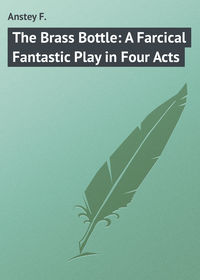 полная версия
полная версияIn Brief Authority
Mr. Treuherz and the heralds stood at attention in the hall. While Clarence and his father struggled into their great-coats, neither of them in a very good temper, Mr. Stimpson being annoyed at postponing his dinner for what he called "tomfoolery," and Clarence secretly sulky because his parent could not be induced to see the propriety of going up to change his tie.
"I haven't yet made out, Mother," said Edna, as they came downstairs, "exactly where we're going to – or what we're expected to do when we get there."
"It will either be The Hermitage – Lady Harriet's, you know – or Mr. Troitz's country house, wherever that is. And, of course, the Committee require to know what times will suit us for rehearsing."
"I wish you'd settle it all without me," complained Edna. "I'd much rather stay at home, and run over my lecture notes… Well, if I must come, I shall bring my note-book with me in case I'm bored." And she ran into the drawing-room, and came back with the note-book, rather as an emblem of her own intellectual superiority than with any intention of referring to it. However, as will be found later, the manuscript proved to be of some service in the future.
Daphne and Ruby were the last to join the party in the hall, Ruby wildly excited at the unexpected jaunt and the prospects of not going to bed till ever so late, and Daphne, though a little doubtful whether Mrs. Stimpson was quite justified in bringing her, inclined to welcome almost any change from the evening routine of "Inglegarth." And then, after Mrs. Stimpson had given some hurried instructions to the hopelessly mystified Mitchell, the whole family issued out of the Queen Anne porch, and were conducted by Treuherz, who, to their intense confusion, insisted on walking backwards to the car, while the heralds performed another flourish on their silver trumpets. It was pitch-dark when they had got to the asphalt pavement outside their gates, but they could just make out the contours of the car in the light that streamed across the hedge to the stained glass front-door.
"Jolly queer-looking car," said Clarence. It was certainly unusually large, and seemed to have somewhat fantastic lines and decorations.
"Oh, never mind about the car!" cried Mrs. Wibberley-Stimpson, who was inside it already, a vague, bundled-up shape in the gloom. "It's part of the Pageant, of course! Get in, Clarence, get in! We're late as it is! and if there's a thing I detest, it's keeping people waiting!"
"All right, Mater!" said Clarence, clambering in. "I can't make out what the dickens they've done with the bonnet – but we seem to be moving, what?"
Slowly the car had begun to glide along the road. Mr. Treuherz was seated in front, probably at the steering-wheel, though none was visible. The heralds sat in the rear, and the car was of such a size that there was abundant room for the family in the centre. Some yards ahead they heard a curious dry rustle and clatter, and could distinguish a confused grey mass of forms that seemed to be clearing the way for them, though whether they were human beings it was not possible to tell till they passed a lighted street-lamp.
"Why, goodness gracious!" exclaimed Mrs. Wibberley-Stimpson, "they look like – like ostriches!"
She was mistaken here, because they were merely storks, but, before she could identify them more correctly, they all suddenly rose in the air with a whirr like that of a hundred spinning looms – and the car rose with them.
"Stop!" screamed Mrs. Wibberley-Stimpson, "Sidney, tell Mr. Troitz to stop! I insist on knowing where we are being taken to!"
Treuherz glanced over his shoulder. "Where should I conduct your Majesties," he said, "but to your own Kingdom of Märchenland?"
Mrs. Stimpson and her husband would no doubt have protested, demanded explanations, insisted upon being put down at once, had they been able; but, whether it was that the car had some peculiarly soporific tendency, or whether it was merely the sudden swift rush through the upper air, a torpor had already fallen on the whole Stimpson family. It was even questionable if they remained long enough awake to hear their destination.
Daphne, for some reason, did not fall asleep till later. She lay back in her luxuriously cushioned seat, watching the birds as they flew, spread out in a wide fan against the dusky blue evening sky. Gablehurst, with its scattered lights, artistic villa-residences, and prosaic railway station – its valley and common and wooded hills, were far below and soon left behind at an ever increasing distance. But she did not feel in the least afraid. It was odd, but, after the first surprise, she had lost all sense of strangeness in a situation so foreign to all her previous experience.
"So we're being taken to Märchenland," she was thinking. "That's the same as Fairyland, practically. At least it's where all the things they call Fairy stories really happened, and —why I can't imagine – but Mr. and Mrs. Stimpson have been chosen King and Queen! And the poor dear things have no idea of it yet! Oh, I wonder" (and here, no doubt, the little creases came into her cheeks again, for she laughed softly to herself), "I wonder what they'll say or do when they find out!" And while Daphne was still wondering, her eyelids closed gently, and she, too, was sleeping soundly.
CHAPTER III
FINE FEATHERS
Mrs. Wibberley-Stimpson was the first of her party to recover consciousness. When she did, she was greatly surprised to find that it was broad daylight, and that she was lying on a grassy slope, behind which was a forest of huge pines. Close beside her were the recumbent forms of her husband and family, which led her to the natural conclusion that the car must have met with an accident.
"Sidney!" she cried, shaking him by the shoulder. "Speak to me! You're – you're not seriously hurt, are you?"
"Eh, what?" he replied sleepily, and evidently imagining that he was comfortably in bed at home; "all right, my dear, all right! I'll get up and bring in the tea-tray presently. Lots of time… Why, hullo!" he exclaimed, after being shaken once more, as he sat up and rubbed his eyes. "How do we all come to be here?"
The others were awake by this time. "And now we're here," put in Clarence, "where are we, eh, Mater?"
"It is no use asking me, Clarence. I know no more than you do. The last thing I remember was our all getting into the car to go and see the Pageant Committee. I've a vague recollection of ostriches – but no, I must have been dreaming them. However, the car seems to have upset somehow, only I don't see it about anywhere."
"No," said Mr. Stimpson, "or old Thingumagig, or those fellows with the trumpets either."
"Dumped us down here, and gone off with the car," said Clarence. "Looks as if we'd been the victims of a practical joke, what?"
"They would never dare to do that!" said his Mother. "I expect they have missed their way in the dark. Very careless of them. I don't know what Lady Harriet and the Committee will think of me. They'll probably ask somebody else to take the part of Queen before we can get there – for I'm sure we must be a good hundred miles away from Gablehurst!"
"The Baron said that he was taking us to Märchenland, Mrs. Stimpson," said Daphne; "and I'm almost sure that that is where we really are."
"And where may Märchenland be?" inquired Mrs. Stimpson sharply. "I never heard of it myself."
"Well," said Daphne, "it's another name for – for Fairyland, you know."
"Fairyland indeed!" replied Mrs. Wibberley-Stimpson with some irritation. "You will find it difficult to persuade me to believe that I am in Fairyland, Miss Heritage! To begin with, there is no such place, and if there was, perhaps you will kindly tell me how we could possibly have got to it?"
"Through the air," explained Daphne patiently. "That car was drawn by storks, you see – not ostriches."
"When you have quite woke up, Miss Heritage," said Mrs. Stimpson, "you will realise what nonsense you are talking."
"Whatever this place is," said Clarence, "it don't look English, somehow, to me. I mean to say – that town over there – what?" He pointed across the wide plain to a cluster of towers, spires, gables, and pinnacles which glittered and gleamed faintly through the shimmering morning haze.
"It certainly has rather a Continental appearance," observed his father.
"If it has," said Mrs. Wibberley-Stimpson, "it is only some buildings or scenery or something they have run up for the Pageant. So we haven't been taken in the wrong direction after all."
"I believe, Mummy," chirped Ruby, "Miss Heritage is right, and this is Fairyland."
"Don't be so ridiculous, child! You'll believe next that we came here in a car drawn by flying storks, I suppose!"
"D'you know, Mater," said Clarence, "I'm not so sure we mayn't have. What I mean is – there's some sort of flying machine coming along now. I grant you it isn't drawn by storks, but they're birds anyhow, and there seems to be some one in the car too."
"Nothing of the kind!" declared Mrs. Wibberley-Stimpson obstinately. "At least one may fancy one sees anything with the sun in our eyes as it is. Well, upon my word!" she added, still incredulously, as an iridescent shell-shaped chariot attached to a team of snow-white doves volplaned down from a dizzy height to a spot only a few yards away, "I really could not have – who, and what can this old person be?"
The occupant of the chariot had already got out of it, and was slowly coming towards them, supporting herself on a black crutch-handled staff. As she drew nearer they could see that she was a woman of great age. She wore a large ruff, a laced stomacher, wide quilted petticoats, and a pointed hat with a broad brim. Her expression was severe, but not unkindly, while she evidently considered herself a personage of some importance.
"She looks exactly like the Fairy Godmother in the pictures," whispered Ruby.
"Whoever she may be," said her Mother, scrambling to her feet with more haste than dignity, "I suppose I shall have to go and speak to her, as I presume I am the person she has come to meet."
However, it was Daphne who was addressed by the new-comer.
"The Court Chamberlain, Baron Treuherz von Eisenbänden, has brought me the glad tidings of your arrival, my child," she said in a high cracked voice, "and, as the high official Court Godmother to the Royal Family, I felt that I should be the first to bid you welcome."
This was more than Mrs. Wibberley-Stimpson could be expected to stand without a protest.
"Pardon me," she said, throwing back her cloak as though she were in need of air, "pardon me, Madam, but I think you are mistaking my daughter's governess for me. I am Mrs. Wibberley-Stimpson!"
The old lady turned sharply, and as her eyes fell on the matron's indignant face and heaving bosom, she instantly became deferential and almost apologetic. "You must forgive me, my dear," she said, "for not recognising you before. But at my age – I may tell you I am nearing the end of my second century – one is apt to forget the flight of Time. Or it may be that Time in your world flies more quickly than in ours. I did not stay to hear more from the Baron than that he had succeeded in finding our Queen, and, to be quite plain with you, I was unprepared to find you so mature."
Then, thought Mrs. Wibberley-Stimpson confusedly, she had been brought here for the Pageant after all. But what very odd people seemed to be getting it up!
"Baron – whatever his name is, appeared to be quite satisfied that I was suited to the part," she said coldly. "Of course, if you require someone younger – "
"There can be no manner of doubt, my dear, that you are the Queen we have been seeking, so the mere fact that you are rather older than some of us expected is of no importance whatever."
"Thank you," said Mrs. Wibberley-Stimpson. "I do not consider myself more than middle-aged, and have generally been taken for younger than I am, Mrs. – , I haven't the pleasure of knowing your name."
"Here they call me the Fairy Vogelflug; in the neighbouring Kingdom of Clairdelune my name is Voldoiseau. I have officiated as Court Godmother to the reigning Royal families in both countries for many generations."
"I thought you were a Fairy Godmother!" cried Ruby; "and I'm sure you're a good Fairy, and can do all sorts of wonderful things."
"I used to, my child, in my younger days, but my powers are not what they were, and I seldom exercise them now, because it exhausts me too severely to do so. Once there were several of us Court Godmothers, but I am the only one left, and my health is so poor that I can do little for my God-children but give them moral teaching and wise counsel. However, such good offices as I can still render shall be entirely at your service."
"You are very kind," said Mrs. Wibberley-Stimpson, resenting the other's air of patronage, "but all my children are already provided with God-parents. As you tell me you are a Fairy," she continued, "I suppose I must accept your word for it – but it will take a great deal more than that to make me believe that we are in Fairyland."
"I thought," said the Fairy, "you already knew that the name of this country is Märchenland."
It should be said here once for all that the Wibberley-Stimpsons found no difficulty in understanding, or making themselves perfectly intelligible to any Märchenlanders, although they always had a curious feeling that they were conversing in a foreign language.
"Whatever the country is called," said Mrs. Wibberley-Stimpson aggressively, "I should like some explanation of that Baron Troitz's conduct in entrapping us into coming here. I was distinctly given to understand that I had been chosen to be the Queen at our local Pageant, and that we were being taken to talk over the arrangements with the Committee. Now he has gone off in the most ungentlemanly way, and left us stranded and helpless here!"
"You must have misunderstood the good Baron," said the Fairy Vogelflug; "and he is far too loyal to desert you. He has merely hastened on to Eswareinmal, the city whose walls and towers you see yonder, to prepare for your reception. As you probably know, he has devoted himself with the most untiring zeal to his mission of seeking you out and restoring you to your inheritance."
"He never said a word about that to me – not a word. If I am really entitled to any property in this country, I should be glad to know where it is situated, and what is its exact value."
"Then," said the Fairy, "I may inform you that you are entitled, as the daughter of your late Father – our long-lost and much-lamented Prince Chrysopras – to no less a possession than the Crown of Märchenland."
"You – you don't say so!" gasped Mrs. Wibberley-Stimpson. "The Crown of – Sidney, did you hear that."
"It's some mistake, my dear," he said. "Must be! … My wife's father, Ma'am, though in some respects – a – a remarkable character, was never a Prince – at least that I've heard of."
"It doesn't at all follow, Sidney," said his wife in a nettled tone, "that anything you don't happen to have heard of is not a fact. There always was a mystery about poor dear Papa's origin. He was most reticent about it – even with me. And I know it was rumoured that Prinsley was not his real name. So it would not surprise me in the least if Mrs. Fogleplug turned out to be right, though I cannot say till she gives us further particulars."
"I will do so most willingly," said the Fairy. "But as it will take me some time to relate them, I should strongly advise you all to sit down."
They seated themselves round her in a semicircle, and presently she began:
"You must know," she said, "that our mighty and gracious Sovereign, the late King Smaragd, was twice wedded. By his first wife he had an only son, Prince Chrysopras, a gallant and goodly prince, beloved not only by his father, but by the whole nation. Well, after mourning his first wife for a longer period than is customary, King Smaragd took to himself another, who was much younger than himself, besides being marvellously beautiful."
"And of course she hated the poor Prince," said Ruby. "Stepmothers always do in the stories."
"I have not said she hated him," said the Court Godmother, who did not like her points to be anticipated. "On the contrary, she treated him with every mark of affection, and was constantly bestowing on him gifts of the costliest description. One day she presented him with a wondrous mechanical horse, fiercer and more mettlesome than even the steeds that are born in Märchenland."
"Motor-bike, what," suggested Clarence sapiently.
"A mechanical horse is what I said," repeated the Fairy, "resembling others in shape and beauty, but made of metal. Prince Chrysopras, being a skilful and fearless horseman – "
"Indeed he was!" put in Mrs. Wibberley-Stimpson. "He used to ride regularly in the Row, almost to the last. On 'Joggles,' such a dear brown fat cob. He was one of what I believe was known as 'The Liver Brigade' … a fact which for some reason I can't pretend to fathom seems to be causing you amusement, Miss Heritage."
Daphne, whose sense of humour was occasionally an inconvenience to her, had certainly found the notion of a Fairy Prince in the Liver Brigade a little too much for her gravity. However, she attributed her lapse to the name of the horse.
"It was the name they gave it at the Livery Stables," said Mrs. Wibberley-Stimpson. "And I really cannot see myself – but we are interrupting this good lady here."
"You are," said the Fairy. "I was about to say that Prince Chrysopras was greatly delighted by his Royal Stepmother's gift, and at once leapt on the back of the strange steed."
"What I call asking for trouble," commented Clarence.
"I know what happened!" Ruby struck in eagerly. "It flew right up into the air with him, and poor Grandpapa fell off."
"If he had, none of you would be here at the moment," said the Fairy. "Don't be in such a hurry, my child. He was much too good a rider to fall off. But the horse flew up and up with him till both could no longer be seen. The remains of the steed were found long afterwards on a mountain top. But nothing more was ever seen of the Prince, who was supposed to have perished in one of our lakes."
"Then he must have fallen off after all," insisted Ruby.
"No, no, Ruby," said her mother, with a sense that, where the credit of her family was concerned, nothing was too improbable for belief; "the horse flew with him to England, or somewhere in Europe – or else he couldn't have met your dear grandmother, whom none of you ever saw, for she died long before you were born. And I expect that, after he got off, the horse flew back again, and was just able to get to Märchenland before the machinery broke down. And dear Papa very naturally would not care for people to know that he had got there by such peculiar means, which accounts for my never having heard of it before."
"Exactly," said the Fairy Vogelflug; "but King Smaragd only knew that his son was lost to him, and when he discovered that the horse was enchanted, and that his Queen had bribed the Hereditary Grand Magician to construct it, his anger knew no bounds."
"Enough to annoy anybody," said Mr. Wibberley-Stimpson. "I should certainly – "
"He ordered," the Fairy went on, without appearing to feel any interest in what Mr. Stimpson would have done in similar circumstances, "both the Queen and the Grand Magician to be enclosed in a barrel, the inside of which had been set with sharp nails, and rolled down into the lake from the top of the mountain."
"I should say myself," remarked Mr. Stimpson, "that that was going a little too far. But he certainly had great provocation."
"He also commanded that all wizards and enchanters should renounce their practices for ever, and adopt some other calling, or be banished from the Country."
"There," said Mrs. Wibberley-Stimpson approvingly, "I think he was so right. I would never encourage any of those clairvoyant people myself. And did he marry a third wife at all?"
"Not if he was wise!" said Clarence.
"No, although it grieved him sorely that he had no heir to succeed him. But towards the end of his days, he dreamed repeatedly that his son was yet living. He beheld him in these visions a wanderer in some far-off land, earning his bread as a musician, for in Music he had rare skill."
"I fancy he must have given it up when he took to Finance," said Mrs. Wibberley-Stimpson, "though he kept his taste for it. I well remember his buying a beautiful orchestrion which used to be in the Picture Gallery."
"Well," pursued the Fairy, "in further dreams it was revealed to the King that his son was married to one, who, though not of his own race or rank, was both gently born and very fair to see."
"Pollentine was the maiden name of your Grandmother on my side, my dears," explained Mrs. Stimpson to her family. "She must have been good-looking as a girl, judging by a daguerrotype I had of her. Her father was a highly distinguished Auctioneer and Estate Agent in East Croydon, as I daresay was also revealed in the King's dream."
"Of that I can say nothing," replied the Court Godmother; "but I know that further visions showed him his son as a widower with an only daughter, and later still that he was no longer living. And so much was the King impressed that he caused a search to be made for this grand-daughter of his in every country that is known to us. Even when he lay on his death-bed he did not give up hope that she would be found, and so he left his Kingdom in charge of his trusted favourite Marshal Federhelm as Regent, with strict injunctions to continue seeking for the missing Queen."
"And how," inquired Mrs. Wibberley-Stimpson, "did the Marshal manage to find me out?"
"It was not he. He soon convinced himself that all further endeavours were useless. No, it is to the devotion of our worthy Court Chamberlain, the Baron Treuherz von Eisenbänden, that your discovery is owing. He had grieved so deeply to see Märchenland without a Sovereign that, after the example of 'Faithful John,' the founder of his family, he had placed iron hoops round his chest to keep his heart from breaking."
"We heard 'em go," said Clarence; "thought it was only his braces."
"At length," continued the Fairy, "the Baron went in secret to Xuriel, the Astrologer Royal, and induced him to consult the stars. Which Xuriel did, and by much study and intricate calculation he succeeded in ascertaining the exact spot in the other world where the Queen would be discovered, and even the means by which she might be recognised."
"Ah," said Mrs. Wibberley-Stimpson, "I shall begin to believe in Astronomy after this. But even now I don't quite understand how Baron Troitz got to 'Inglegarth.'"
"That was by my assistance. I placed my travelling car at his service, with the wise storks that fly straight to any place to which they are directed, even though they may never have heard of it before. Happily for Märchenland, Xuriel's calculations have proved correct, except that he did not foresee that the Baron would bring back two Sovereigns instead of one."
"What – is the Gov'nor going to be King?" inquired Clarence. "My hat!"
"That would be ridiculous, Clarence," said his mother, "when your Father hasn't a drop of Royal blood in his veins! He can't even rank as Prince Consort!"
"Not so, my dear, not so," corrected the Fairy, "by the custom of Märchenland, anyone who weds the Sovereign shares the throne, and your husband will be as truly the King of this Country as you will be its Queen."
"Oh, is that the rule?" said Mrs. Wibberley-Stimpson, not best pleased. "Well, Sidney, I trust you will show yourself equal to your position, that is all."
"I trust so, my love," he replied uneasily. "It – it's come on me at rather short notice. However!"
"If Daddy and Mums are King and Queen," asked Ruby, "will Edna and me be Princesses?"
"Undoubtedly you will," said the Court Godmother.
"Then Clarence will be a Prince. So you see, Miss Heritage, dear, you have met a Prince after all!"









